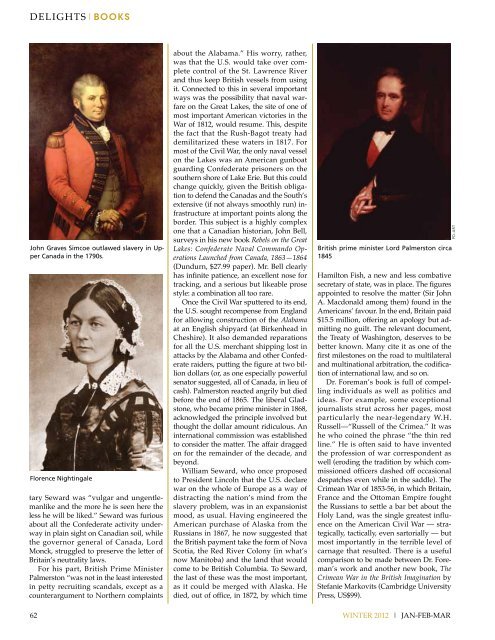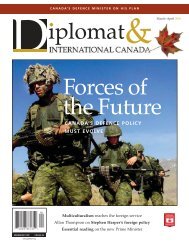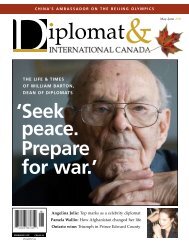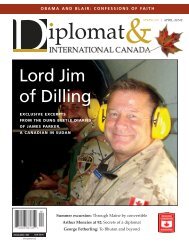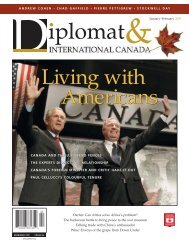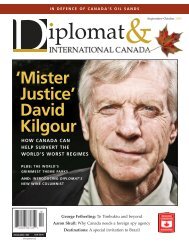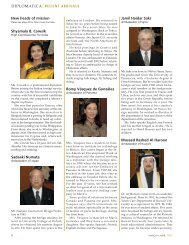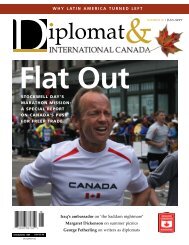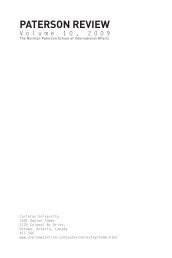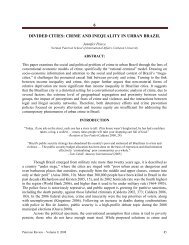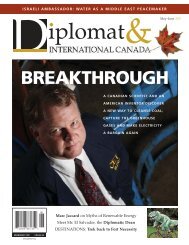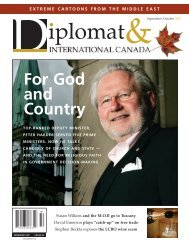John Baird: Canada's freedom agenda - Diplomat Magazine
John Baird: Canada's freedom agenda - Diplomat Magazine
John Baird: Canada's freedom agenda - Diplomat Magazine
You also want an ePaper? Increase the reach of your titles
YUMPU automatically turns print PDFs into web optimized ePapers that Google loves.
DELIGHTS|BOOKS<strong>John</strong> Graves Simcoe outlawed slavery in UpperCanada in the 1790s.Florence Nightingaletary Seward was “vulgar and ungentlemanlikeand the more he is seen here theless he will be liked.” Seward was furiousabout all the Confederate activity underwayin plain sight on Canadian soil, whilethe governor general of Canada, LordMonck, struggled to preserve the letter ofBritain’s neutrality laws.For his part, British Prime MinisterPalmerston “was not in the least interestedin petty recruiting scandals, except as acounterargument to Northern complaints62about the Alabama.” His worry, rather,was that the U.S. would take over completecontrol of the St. Lawrence Riverand thus keep British vessels from usingit. Connected to this in several importantways was the possibility that naval warfareon the Great Lakes, the site of one ofmost important American victories in theWar of 1812, would resume. This, despitethe fact that the Rush-Bagot treaty haddemilitarized these waters in 1817. Formost of the Civil War, the only naval vesselon the Lakes was an American gunboatguarding Confederate prisoners on thesouthern shore of Lake Erie. But this couldchange quickly, given the British obligationto defend the Canadas and the South’sextensive (if not always smoothly run) infrastructureat important points along theborder. This subject is a highly complexone that a Canadian historian, <strong>John</strong> Bell,surveys in his new book Rebels on the GreatLakes: Confederate Naval Commando OperationsLaunched from Canada, 1863—1864(Dundurn, $27.99 paper). Mr. Bell clearlyhas infinite patience, an excellent nose fortracking, and a serious but likeable prosestyle: a combination all too rare.Once the Civil War sputtered to its end,the U.S. sought recompense from Englandfor allowing construction of the Alabamaat an English shipyard (at Birkenhead inCheshire). It also demanded reparationsfor all the U.S. merchant shipping lost inattacks by the Alabama and other Confederateraiders, putting the figure at two billiondollars (or, as one especially powerfulsenator suggested, all of Canada, in lieu ofcash). Palmerston reacted angrily but diedbefore the end of 1865. The liberal Gladstone,who became prime minister in 1868,acknowledged the principle involved butthought the dollar amount ridiculous. Aninternational commission was establishedto consider the matter. The affair draggedon for the remainder of the decade, andbeyond.William Seward, who once proposedto President Lincoln that the U.S. declarewar on the whole of Europe as a way ofdistracting the nation’s mind from theslavery problem, was in an expansionistmood, as usual. Having engineered theAmerican purchase of Alaska from theRussians in 1867, he now suggested thatthe British payment take the form of NovaScotia, the Red River Colony (in what’snow Manitoba) and the land that wouldcome to be British Columbia. To Seward,the last of these was the most important,as it could be merged with Alaska. Hedied, out of office, in 1872, by which timeBritish prime minister Lord Palmerston circa1845Hamilton Fish, a new and less combativesecretary of state, was in place. The figuresappointed to resolve the matter (Sir <strong>John</strong>A. Macdonald among them) found in theAmericans’ favour. In the end, Britain paid$15.5 million, offering an apology but admittingno guilt. The relevant document,the Treaty of Washington, deserves to bebetter known. Many cite it as one of thefirst milestones on the road to multilateraland multinational arbitration, the codificationof international law, and so on.Dr. Foreman’s book is full of compellingindividuals as well as politics andideas. For example, some exceptionaljournalists strut across her pages, mostparticularly the near-legendary W.H.Russell—“Russell of the Crimea.” It washe who coined the phrase “the thin redline.” He is often said to have inventedthe profession of war correspondent aswell (eroding the tradition by which commissionedofficers dashed off occasionaldespatches even while in the saddle). TheCrimean War of 1853-56, in which Britain,France and the Ottoman Empire foughtthe Russians to settle a bar bet about theHoly Land, was the single greatest influenceon the American Civil War — strategically,tactically, even sartorially — butmost importantly in the terrible level ofcarnage that resulted. There is a usefulcomparison to be made between Dr. Foreman’swork and another new book, TheCrimean War in the British Imagination byStefanie Markovits (Cambridge UniversityPress, US$99).WINTER 2012 | JAN-FEB-MARPD-Art


